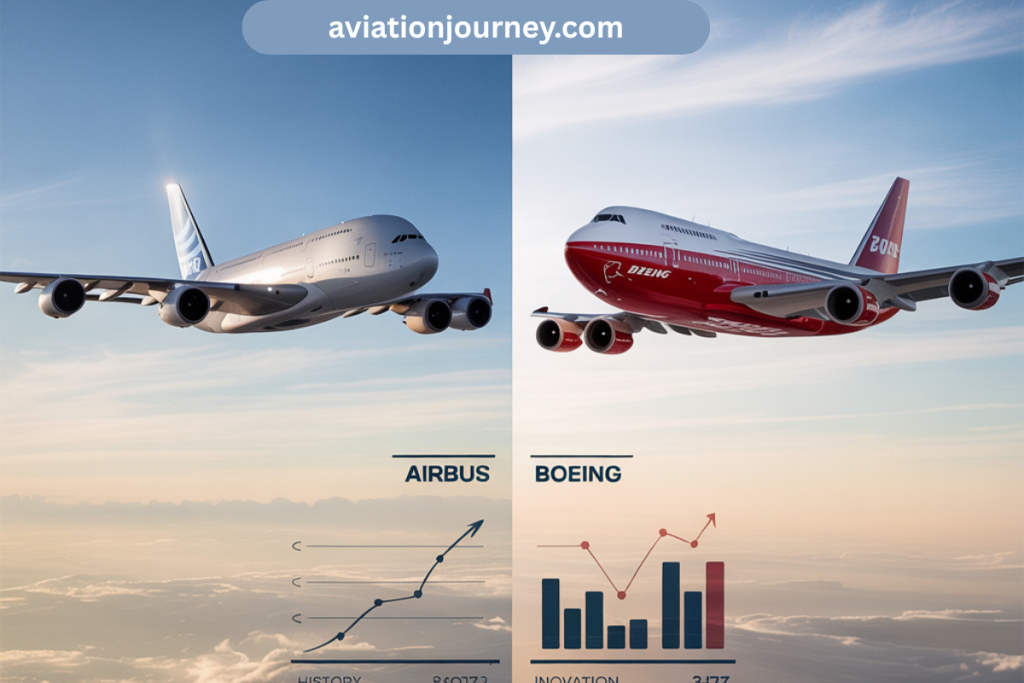Airbus vs Boeing: The Ultimate Comparison

Few rivalries in the world of aviation are as iconic as Airbus vs Boeing. For decades, these two aerospace giants have shaped how the world travels, innovates, and even dreams about flight. While both companies aim to connect people and places, their approaches, philosophies, and designs reveal unique identities. This comparison isn’t just about airplanes—it’s about competition, innovation, and the future of global aviation.
A Brief History
Boeing, founded in 1916 in Seattle, USA, has been a pioneer of aviation for more than a century. Its legendary aircraft, like the 747 “Queen of the Skies,” revolutionized long-haul travel. Boeing has built a reputation for bold engineering and a strong foothold in both commercial and military aviation.
Airbus, on the other hand, was born in 1970 as a European response to America’s dominance in aerospace. With headquarters in Toulouse, France, Airbus quickly became known for its collaborative European model and groundbreaking designs like the double-deck A380—the largest passenger aircraft ever built.
Design Philosophy
Boeing often emphasizes pilot control and traditional flying experience. Many Boeing aircraft use a control column (yoke), giving pilots a more tactile sense of flight. Boeing designs tend to focus on efficiency while keeping the pilot at the heart of decision-making.
Airbus takes a more technology-driven approach, relying on “fly-by-wire” systems and side-stick controls. This system automates many functions, allowing for smoother handling and reduced pilot workload. For Airbus, technology is the co-pilot.
Popular Aircraft
- Airbus A320 vs Boeing 737
This is the most direct rivalry in aviation history. The A320, launched in 1988, pioneered fly-by-wire and quickly became a favorite for airlines in Europe and beyond. The Boeing 737, first introduced in 1967, has undergone numerous upgrades, with the 737 MAX being the latest. Together, these two models dominate short to medium-haul markets. - Airbus A350 vs Boeing 787 Dreamliner
Both are long-haul, fuel-efficient aircraft designed for the modern era. The A350 offers a slightly larger frame and advanced composite materials, while the 787 boasts flexibility and range. Passengers often praise both for better cabin air quality, bigger windows, and quieter flights. - Airbus A380 vs Boeing 747
These two giants once symbolized the peak of aviation. The A380 holds more passengers than any other aircraft but struggled with operating costs. Boeing’s 747, although now retired from most fleets, is remembered as the airplane that democratized long-haul international travel.
Market Share and Global Reach
Boeing once led global aviation, especially in North America and Asia. However, recent setbacks like the 737 MAX crisis damaged its reputation. Airbus seized the moment, surpassing Boeing in deliveries for several years. Today, Airbus has a strong presence in Europe, the Middle East, and Asia, while Boeing remains deeply rooted in the U.S. market and military aviation.
Passenger Experience
Airbus focuses on comfort and innovation—wider seats on many models, quieter cabins, and advanced air filtration. Passengers often appreciate the A350 and A380 for their spacious design.
Boeing emphasizes flexibility and range. The 787 Dreamliner is praised for its large windows with electronic dimming and improved cabin pressure that reduces jet lag. Airlines love Boeing for the ability to connect smaller cities directly without relying on big hubs.
Sustainability and the Future
Both companies are racing toward greener skies. Airbus is heavily investing in hydrogen-powered aircraft and envisions carbon-neutral aviation by 2050. Boeing focuses on improving efficiency through sustainable aviation fuels (SAF) and upgrading current designs for better fuel burn.The competition is now less about size and more about sustainability, digitalization, and passenger well-being.
So, Who Wins?
The truth is, there is no single winner in the Airbus vs Boeing debate. Airlines and passengers benefit most from their rivalry. Boeing brings tradition, range, and engineering daring, while Airbus offers innovation, comfort, and technological efficiency. Together, they push aviation forward, making flying safer, greener, and more accessible.
Final Thought:
Whether you prefer Airbus or Boeing, every flight you take is shaped by this rivalry. It is a story not just of planes, but of people—engineers, pilots, and travelers—who continue to connect the world one journey at a time.
